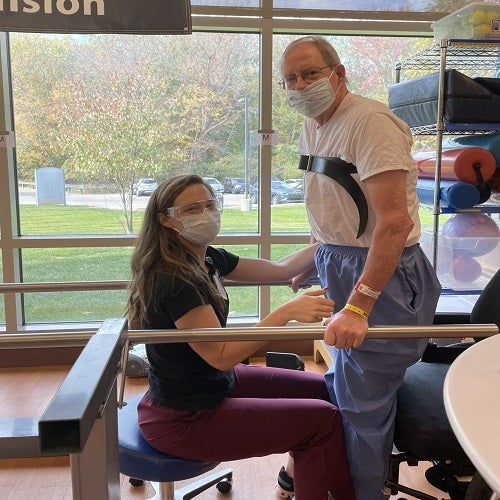Chelsea Hospital Helps Patient Overcome Guillain-Barre Syndrome
August 16, 2023
By: Von Lozon
Categories: Health & Wellness
In Aug. 2022, 65-year-old Howell native Mark Klett fell ill with an upper respiratory cold. A Type 2 Diabetic, he takes vitamins, eats nutritious food, and leads a healthy lifestyle, so coming down with a cold was highly unusual.
A couple weeks later, Klett’s symptoms worsened to the point where he lost feeling in his right hand. He was taken to a nearby hospital where he was evaluated for a stroke, but all those tests came back negative.
Things got worse upon discharge. Klett lost his appetite and couldn’t eat anything without vomiting. The numbness that began in his hand went down to his legs, making him unable to walk. His wife and son took him to University of Michigan Hospital in Ann Arbor, which is where he was diagnosed with Guillain-Barre Syndrome.
Guillain-Barre Syndrome is a rare autoimmune disorder where the body’s immune system attacks the nervous system. It spreads quickly and can paralyze the entire body. There is no known cure for it and its unknown exactly how people contract it, although most patients report having a separate infection prior to diagnosis, so his original infection may have had something to do with it.
Klett’s three-week stay at U-M consisted of constant bed rest, ingesting food through a stomach tube, and getting water by sucking on ice cubes. He was eventually transferred to Chelsea Hospital’s Inpatient Rehabilitation Unit, where both Trinity Health Michigan and University of Michigan Health physicians cared for him. He slowly gained back his ability to eat food, which was important for him being a Type 2 Diabetic.
“I was able to get my diet back on track with a low carb plan,” Klett said. “That was a huge help for me – getting back to eating the way I needed to for my diabetes. Everything I had was prepared well, and everything was hot when they got it to you. Everything they had at the hospital was cooked excellent.”
The food wasn’t the only good thing about Klett’s stay at Chelsea Hospital. The support staff -- including the nursing staff and physical therapy team -- were also “really good” and “really friendly.” But one physical therapist stood out among the rest: Melissa Ehrman.
Ehrman was Klett’s primary physical therapist for roughly 30 days in the Inpatient Rehabilitation Unit at Chelsea Hospital.
“Initially, he had no feeling in his lower-body and was very weak,” Ehrman said. “He started off using a ceiling lift to get in and out of bed and his wheelchair. Despite his challenges, he was very determined and worked incredibly hard on his strength, and over time, he got stronger. By the time he was leaving the hospital, he progressed to being able to walk about 30 feet with a walker and one person by his side and a second person following with a wheelchair for safety. He was in great spirits and continued to work hard to reach his goals even after he left the hospital.”
After his 30 days of physical therapy, Klett was able to go back home and continue his recovery. One year later, he is still recovering, but is now in a much better position. He can now perform routine tasks like driving a car. He can also enjoy some of his hobbies again, like playing the trumpet and being outdoors. He even drove himself to Wyoming in June for a handgun hunter’s competition where he “performed really well.” He isn’t where he wants to be yet, but he is on his way to being 100 percent again.
“I still have to be careful – there’s a certain level of numbness below my knees – but I can walk well,” Klett said. “Things are slowly getting better every day and every week. I wouldn’t be where I’m at today without the help of everybody I met at Chelsea Hospital.”



